August 2017 Newsletter

August 2017 Newsletter
As a legislator, the most vital part of my job is to remain connected to you – understanding your issues and finding a consensus view in our 19-city, 950,000-resident district. The votes I take and bills that I introduce are done with you in mind, always. It goes without saying, then, that the most invigorating part of my job is when I meet you, whether at the grocery store, town halls or at your work site. It is an honor to serve you, and I look forward to meeting you at future events.
Here’s a look at what I have been up to since my last newsletter.
Highlights of this issue:
- A recent daylong tour of the district with some visitors
- A renewed call on Congress to rename Confederate public places
- An update on our Select Committee on Student Success
- Our district Education Forum
- Re-opening Miner Road
- A legislative update

Senator Steve Glazer
Senate District 7
Whenever I travel through the 7th District, I am awestruck by its beauty – the landscape of rolling hills and old oak trees. But, I also am always impressed by the distinct flavor of each community, with so many good people forging ahead with efforts to make things better in their neighborhoods, schools and parks.
 So, I was eager to show off the diversity of my Senate district when members of the California Association of Realtors joined me on a day-long tour in early August.
So, I was eager to show off the diversity of my Senate district when members of the California Association of Realtors joined me on a day-long tour in early August.
First, we took back roads from Lafayette to Brentwood, with those rolling hills and old oak trees forming the backdrop. Our first stop was at the G&S Farms to learn about the summer harvesting of sweet corn, the agricultural history of the area, challenges the farm is facing, including the encroachment of development, water and land use, as well as labor and regulatory concerns. The Stonebarger family graciously hosted us, and we all got a taste of the sweet corn.

We then drove on to Antioch, where we took a walking tour of the city’s charming downtown as Mayor Sean Wright (to my left in this photo) described his vision of reviving his city’s economic prospects by attracting new businesses and manufacturers.
Mayor Wright provided us with a candid assessment of the city’s growth, challenges and opportunities. During our walking tour, we saw the old Humphrey’s Restaurant (named after Humphrey the Whale, who made a splash in the area in the mid-1980s), the Amtrak Station, resources for homeless, and sites identified in the Northern Waterfront Initiative.
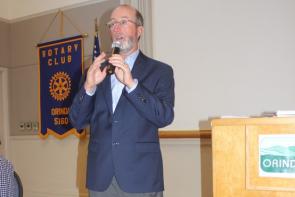 |
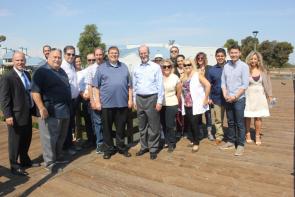 |
For lunch, we joined the Orinda Rotary Club, which continues its fantastic service for people in need, either near home with such programs as Meals on Wheels for seniors, or abroad where the Rotary has helped purchase a bus for the Little Flock Orphanage in India, helped fund dental clinics in Kenya, school construction in Burkina Faso; and the distribution of prosthetic hands for the disabled in Viet Nam.
Later, we got a peek into the future in San Ramon by taking test rides on new autonomous buses, the Easy Mile Shuttle. The project’s goal is to have Easy Mile Shuttles providing personalized transit service to cut down on traffic congestion and, ultimately, greenhouse gases. I’m proud that the 7th District is also home to the largest private autonomous testing site in the US at the former Concord Naval Weapons Station.
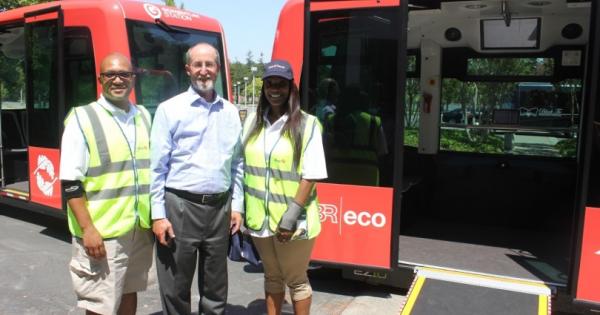 |
|
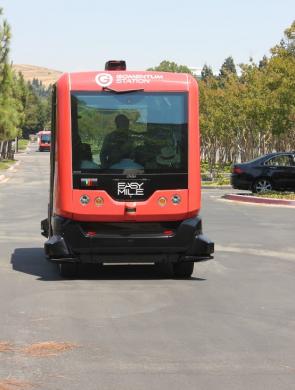 |
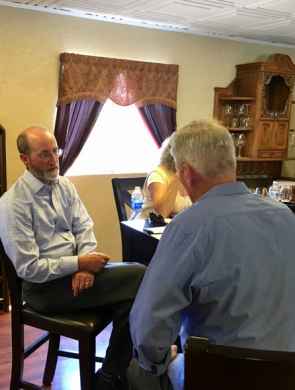 |
And we ended the day in Livermore at the award-winning Steven Kent Winery. Winemaker and owner, Steven Kent Mirassou, shared his family’s long history in the Livermore Valley, and his current day challenges and opportunities.
Calling on Congress to Remove Names of Confederate Leaders From Public Places
I join in the outrage over the white supremacist march in Charlottesville, Virginia. The sight of people carrying torches, swastika banners and Confederate flags – rallying against the removal of a statue of Confederate General Robert E. Lee - was a reminder that we have so much more to do to bring Americans together. Any movement that includes Nazis, the KKK and white supremacists needs to be treated as a threat to our long-held principles of diversity, equality and opportunity for all.
Members of both parties have criticized the President’s tepid reaction to the events in Charlottesville. They should back that up by voting to remove the names of Confederate leaders from federal places. Ten U.S. military bases are named after Confederate leaders; numerous statues of Confederate leaders stand in the U.S. Capitol.
A full discussion of the Confederacy’s political and military leaders belongs in the history books, not in our public places of honor.
Read my full statement here.
CSU showed commitment to improving 4-year grad rates at first Select Committee hearing on Student Success
 |
| Senator Glazer addressing Jeff Gold, the Assistant Vice Chancellor of Student Success Initiatives, Research, and Innovation, during a June hearing of the Select Committees on Student Success. |
I chaired the first hearing of the Select Committee on Student Success in June, where we heard from California State University faculty, executives and a student representative on the significant steps they are taking to improve four-year graduation rates.
Jeff Gold, the Assistant Vice Chancellor of Student Success Initiatives, Research, and Innovation, said it is critical that CSU leadership make on-time graduation a central theme in their public discussions of their 2025 Graduation Initiative, whose goal is to double four-year graduation rates from 19 percent to 40 percent.
Innovative campus-based practices are being developed with “local flavor”: unique designs to accommodate each CSU campus’s environment.
Sacramento State, for instance, has established the College Ready Program – partnering with 37 high schools to prepare students for the rigors of college. Their “Finish in Four” program opens up more in-demand classes, which is critical in increasing four-year graduation rates.
Chico State has focused on redesigning certain courses that tend to have higher failure rates, a significant hindrance to graduation. More academic content is also being delivered online, which has helped to lower class failure rates.
Over the coming months, I plan to hold further hearings to explore various methods that educators are using to achieve student success, such as how they prepare, admit and engage their students as they strive for on-time graduation.
Members of the Select Committee include: Sen. Ben Allen, D-Santa Monica, the chairman of the Senate Education Committee; Sens. Toni Atkins, D-San Diego, Patricia Bates, R-Laguna Niguel, Bill Dodd, D-Napa, Ricardo Lara, D-Bell Gardens, Anthony Portantino, D-Pasadena, and Scott Wilk, R-Victorville.

Local students shared their experiences with hate speech and bullying at school. The discussion began with a thought-provoking presentation by Jewish students who attend local middle and high schools. The students shared a number of troubling examples of anti-Semitic incidents they’ve encountered. Local administrators outlined current initiatives in place at local schools to address issues of racism, bullying, and intolerance, while acknowledging that there is more to be done.
Ameena Jandeli from the Islamic Networks Groups shared information about the racism that some Muslim students and members of our community are confronting, and offered examples of best practices that can be used by students, parents, teachers, governing board members and school administrators. Dr. Karen Sakata and Terry Koehne from the Contra Costa County Office of Education described the County’s “All Kids Are Our Kids” toolkit that provides resources for schools and districts. Dr. Sakata also shared her family’s personal experience with discrimination and racism.
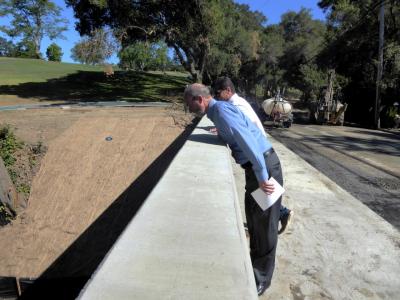 The reopening of Orinda's damaged Miner Road was a result of the kind of public-private collaboration that’s so essential to getting things done, especially in response to emergency repairs.
The reopening of Orinda's damaged Miner Road was a result of the kind of public-private collaboration that’s so essential to getting things done, especially in response to emergency repairs.
Miner Road had been closed since the floods in January created a massive sinkhole. The closure of this key transportation artery was a huge inconvenience to thousands of residents and created significant emergency response delays. The project's size and complexity required a lot of hard work and dedication from many people and agencies.
Larry Theis, Orinda Public Works Director, noted the project construction took about 70 days and has the potential to have 75-90% of the $2.8 million cost funded by state and federal sources due to its emergency nature.
Many thanks to the Orinda City Council, Assemblywoman Catharine Baker, Congressman Mark DeSaulnier, our state and local transportation leaders, including CalTrans Director Malcom Dougherty, Ben Rodriquez, owner of Bay Cities Paving, and Orinda city managers, Steve Solomon and Janet Keeter. Most importantly, thank you to Orinda citizens, whose patience was strained as we worked to get this project funded and completed.
Four of my bills cleared the Senate and are now awaiting action in the Assembly. A fifth bill, SCA 9, is pending in the Senate.
- SB 386: (Smoking) Passed by the Senate. In the Assembly Appropriations Committee.
- Prohibits the use of smoking products of any kind at state beaches and parks to protect the environment and public health.
- SB 501 (Anesthesia) Passed by the Senate. In Assembly Appropriations.
- Strengthens training and staffing requirements for the administration of dental anesthesia to children.
- SCA-9 (Rainwater recapture constitutional amendment) In Senate Appropriations.
- Authorizes the Legislature to provide property tax exclusions for rainwater capture.
- SB 751 (School Reserve Cap) Passed by the Senate. In Assembly Education.
- Raises the level of the statutory reserve limit from 6 percent to 17 percent to allow for school districts to prepare for economic uncertainty.
- SCA 40 (Chronic Fatigue Syndrome) Chaptered and enrolled.
- Proclaims May 12, 2017, as Myalgic Encephalomyelitis/ Chronic Fatigue Syndrome Awareness Day and declares the month of May 2017, and each May thereafter, as Myalgic Encephalomyelitis/Chronic Fatigue Syndrome Awareness Month.
Some significant bills have come through the Legislature this year. Here’s how I’ve voted on them:
AB 398, AB 617 and ACA 1 (Climate Change): Yes
This legislative package on climate change fulfills California's requirement to reduce carbon pollution with the least amount of impact on our people and economy.
That is why environmental and business organizations joined together to urge its adoption.
These bills, which extend the state’s Cap and Trade program through 2030, advance smart environmental policies that are economically sustainable and will protect California jobs.
SB 1 (Beall) Transportation Tax: No
The Bay Area and all of California are in need of improving our roads and highways and reliable transit, so I agree we need additional transportation investments.
But my constituents have told me loud and clear that they want any new taxes to be spent more wisely and effectively. For instance, it doesn’t make sense to spend billions of dollars on a financially unsustainable High Speed Rail system that backers claim might be completed by 2029 when it could go for transportation improvements today.
Californians will now pay an extra 12 cents per gallon for gas, 20 cents per gallon on diesel and from $25 to $175 more on their vehicle license fees. The question is whether these investments will be efficiently and smartly directed to our road and transportation needs.
SB 31 (Lara) Prohibiting Disclosure of Religious Affiliation Information: Yes
Individuals’ privacy rights are paramount in a free society, so I supported SB 31, which would prohibit the state or local agencies from providing the federal government personal information regarding a person’s religious beliefs.
I believe that the freedom to pursue one’s religious beliefs free from government coercion is a cherished tenet of our democracy and should be protected at all times.
SB 562 (Lara) Single Payer Health: No
The proposal to create a single-payer health care system for California had the best of intentions, but I could not support it because it had no financial plan, cost controls or focus on California residents. The Speaker of the California Assembly, Anthony Rendon, agreed, declining to refer it to any committee.
The Affordable Care Act is still the law of the land and it is working. Even with its flaws, the ACA has cut the rate of uninsured in half in California and brought health coverage to millions of people who were without it. As long as that law remains in effect, we should fight to preserve it, defend it and improve it. If Congress and the President repeal the ACA or scale it back, I will examine every option – including single payer -- for making sure that all Californians have access to care.
SB 649 (Hueso) Wireless facilities: No
This bill would establish a new permitting process for small cell wireless facilities, limiting the discretion of local governments to approve or reject these facilities and limiting the fees that local communities can charge to the wireless companies.
This is a bad bill for our communities. It requires cities to give up ownership of their infrastructure and relinquish their ability to collect fees for use of their infrastructure. Cell towers the size of small refrigerators could be erected in neighborhoods with little oversight.
Comings and Goings
- Senator Glazer and Assemblywoman Catharine Baker, R-Dublin, will be keynote speakers at the Livermore Valley Chamber of Commerce on Thursday, September 21.
- 2017 Wine Country Luncheon Series, State of the State Luncheon
- 11:30 a.m. to 1 p.m.
- Tickets and information: https://www.livermorechamber.org/event/state-of-the-state-luncheon or call 925-447-1606.
- Congratulations to the following groups who won grants from the California Arts Council:
- California Shakespeare Theater, Alameda County, $7,750
- Diablo Ballet, Contra Costa County, $16,200
- Shakespeare’s Associates, Livermore, $18,000
- Gold Coast Chamber Players, Contra Costa County, $5,000
- Red Umbrellas, Contra Costa County, $4,988
- Veterans Initiative in the Arts, Contra Costa County, $8,000
